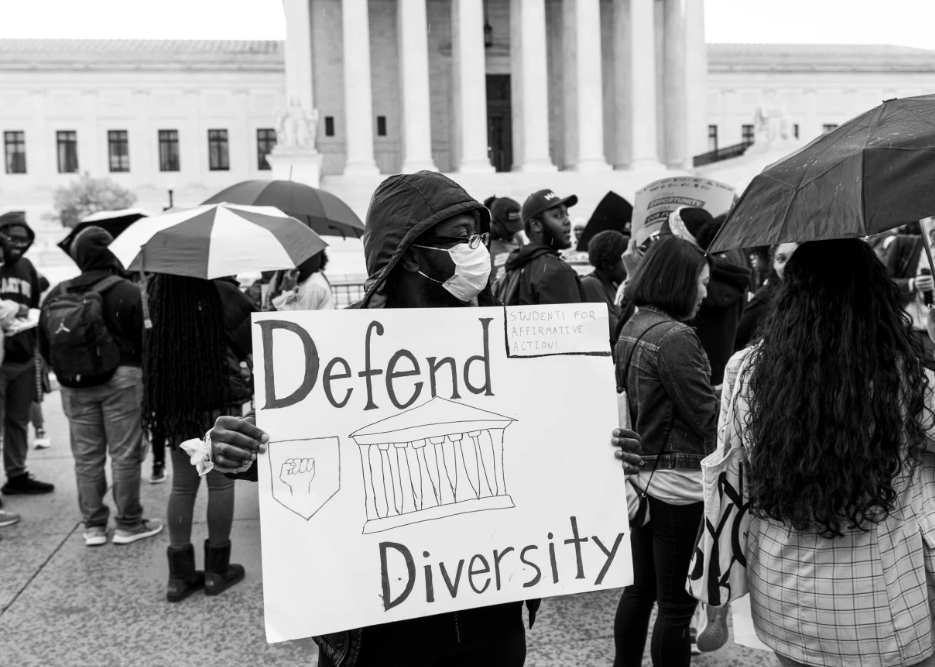The Struggle Over Affirmative Action: Debunking the Myth of Colorblindness
In a groundbreaking ruling on Thursday, the Supreme Court’s Republican-appointed majority, led by Chief Justice John Roberts, dealt a blow to affirmative action in higher education. Their argument? The Constitution is “colorblind.” But in a powerful rebuttal, the Democratic appointees, Justice Sonia Sotomayor and Justice Ketanji Brown Jackson, dismantled this ignorant notion in two separate dissents spanning nearly 100 pages.
Unmasking the Fallacy of Colorblindness
Sotomayor, joined by Jackson and Justice Elena Kagan, boldly declared that the majority’s decision was based on their own policy preferences, disregarding the reality that race has always mattered in American society. She emphasized that deeming race irrelevant in law does not erase its significance in life. Furthermore, Sotomayor exposed the majority’s misinterpretation of the landmark case of Brown v. Board of Education, reminding them that it was a race-conscious decision that recognized the constitutional necessity of racial integration in schools.
A Revisionist History and an Affront to Justice
Sotomayor condemned the majority’s recharacterization of Brown as a “revisionist history” and an insult to the legacy of Justice Thurgood Marshall, who championed true equal opportunity and race-conscious admissions. She highlighted the irony of the majority’s claim of colorblindness while undermining the end of race-based disparities in the country, making their desired colorblind world even more elusive.
The Illusion of Colorblindness
Echoing Sotomayor’s sentiments, Justice Ketanji Brown Jackson criticized the majority’s obliviousness in their pursuit of “colorblindness for all.” She emphasized that deeming race irrelevant in law does not erase its impact in real life. Jackson astutely pointed out the hypocrisy of the majority’s ruling, which conveniently exempted military academies from its application, revealing their selective abhorrence of racial considerations.
A Tragedy for All
Jackson concluded her dissent by lamenting the tragic consequences of the majority’s ruling. By unnecessarily imposing their result, they hinder progress towards a truly equal society. The ruling not only undermines racial diversity in higher education but also perpetuates disparities that hinder the success of underrepresented minorities.
In a battle over the core principles of affirmative action, the dissents of Sotomayor and Jackson provide a compelling counterargument to the majority’s flawed reasoning. They expose the fallacy of colorblindness and challenge the revisionist history employed by the majority. Their powerful words serve as a reminder that true equal opportunity requires acknowledging and addressing the role of race in our society.
Jackson and Sotomayor Expose the Flaws in the GOP Majority’s ‘Colorblind’ Perspective
In recent years, the Republican Party has championed a ‘colorblind’ perspective, arguing that race should not be a factor in policy decisions or judicial appointments. However, the recent remarks by Reverend Jesse Jackson and Supreme Court Justice Sonia Sotomayor have shed light on the flaws in this approach. Both Jackson and Sotomayor have highlighted the importance of acknowledging and addressing racial disparities in order to achieve true equality and justice.
Reverend Jesse Jackson, a prominent civil rights activist, has long been an advocate for racial justice. In a recent interview, he criticized the GOP’s ‘colorblind’ perspective, arguing that it fails to recognize the systemic racism that still exists in our society. Jackson emphasized that ignoring race does not make racism disappear; instead, it perpetuates the inequalities that marginalized communities face. He pointed out that policies and decisions that claim to be ‘colorblind’ often disproportionately affect people of color, further entrenching racial disparities.
Justice Sonia Sotomayor, the first Latina Supreme Court Justice, has also voiced her concerns about the GOP’s ‘colorblind’ perspective. In her dissenting opinion in the 2013 case of Shelby County v. Holder, she argued that the majority’s decision to strike down a key provision of the Voting Rights Act ignored the ongoing racial discrimination faced by minority voters. Sotomayor highlighted the need to consider historical context and the impact of policies on marginalized communities, rather than adopting a simplistic ‘colorblind’ approach.
The flaws in the GOP’s ‘colorblind’ perspective are evident when we examine the consequences of policies that claim to be race-neutral. For example, voter ID laws, which are often touted as necessary to prevent voter fraud, disproportionately affect minority communities who may face greater barriers in obtaining the required identification. Similarly, the criminal justice system, which claims to be blind to race, has been shown to disproportionately target and incarcerate people of color.
By ignoring the role of race in policy decisions and judicial appointments, the GOP majority fails to address the systemic racism that still exists in our society. It perpetuates the myth that we live in a post-racial society, dismissing the experiences and struggles of marginalized communities. This approach not only hinders progress towards true equality but also undermines the principles of justice and fairness that our democracy should uphold.
Acknowledging and addressing racial disparities does not mean advocating for preferential treatment or reverse discrimination. It means recognizing that race continues to play a significant role in shaping individuals’ experiences and opportunities. It means understanding that policies and decisions must be evaluated through a lens that considers historical context and the impact on marginalized communities.
In order to achieve true equality and justice, we must move beyond the flawed ‘colorblind’ perspective. We must actively work towards dismantling systemic racism and creating policies that address the specific needs and challenges faced by marginalized communities. This requires an honest and open dialogue about race and a commitment to rectifying the injustices that persist.
Reverend Jesse Jackson and Justice Sonia Sotomayor have courageously exposed the flaws in the GOP majority’s ‘colorblind’ perspective. Their voices remind us that true progress can only be achieved when we confront the realities of racial inequality and work towards a society that values and uplifts all its members, regardless of their race or ethnicity. It is time for the GOP to reevaluate its stance and embrace a more inclusive and equitable approach that acknowledges and addresses the flaws in their ‘colorblind’ perspective.









